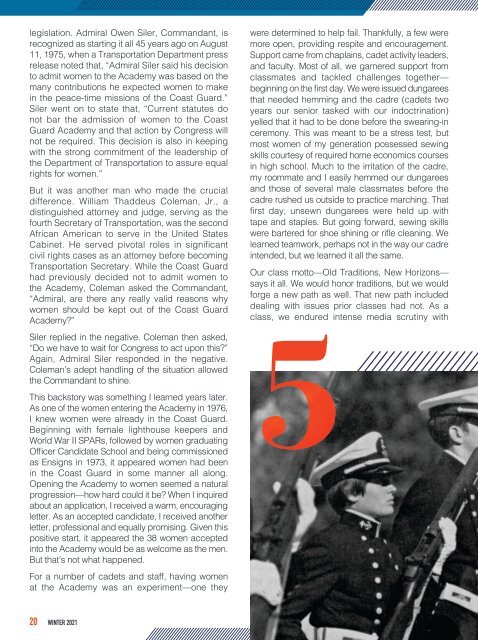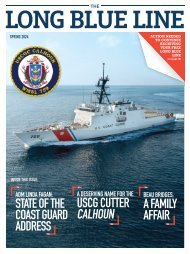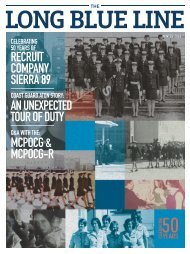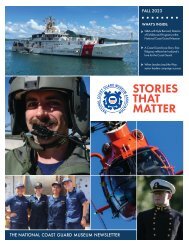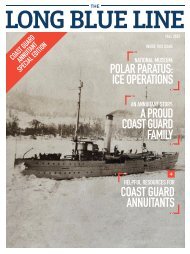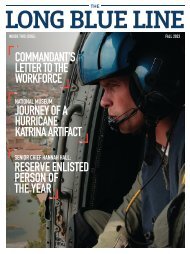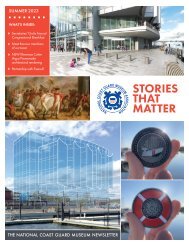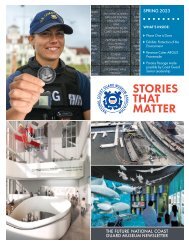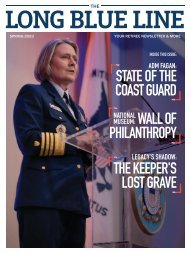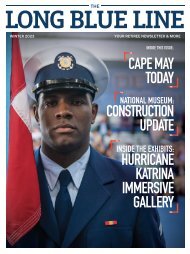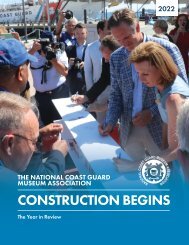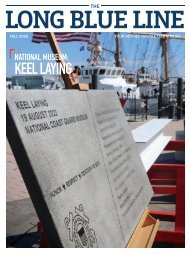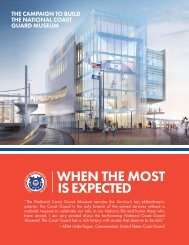The Long Blue Line (Winter 2021)
Quarterly magazine for retirees of the Coast Guard, Public Health Service, and National Oceanic and Atmospheric Association.
Quarterly magazine for retirees of the Coast Guard, Public Health Service, and National Oceanic and Atmospheric Association.
Create successful ePaper yourself
Turn your PDF publications into a flip-book with our unique Google optimized e-Paper software.
legislation. Admiral Owen Siler, Commandant, is<br />
recognized as starting it all 45 years ago on August<br />
11, 1975, when a Transportation Department press<br />
release noted that, “Admiral Siler said his decision<br />
to admit women to the Academy was based on the<br />
many contributions he expected women to make<br />
in the peace-time missions of the Coast Guard.”<br />
Siler went on to state that, “Current statutes do<br />
not bar the admission of women to the Coast<br />
Guard Academy and that action by Congress will<br />
not be required. This decision is also in keeping<br />
with the strong commitment of the leadership of<br />
the Department of Transportation to assure equal<br />
rights for women.”<br />
But it was another man who made the crucial<br />
difference. William Thaddeus Coleman, Jr., a<br />
distinguished attorney and judge, serving as the<br />
fourth Secretary of Transportation, was the second<br />
African American to serve in the United States<br />
Cabinet. He served pivotal roles in significant<br />
civil rights cases as an attorney before becoming<br />
Transportation Secretary. While the Coast Guard<br />
had previously decided not to admit women to<br />
the Academy, Coleman asked the Commandant,<br />
“Admiral, are there any really valid reasons why<br />
women should be kept out of the Coast Guard<br />
Academy?”<br />
Siler replied in the negative. Coleman then asked,<br />
“Do we have to wait for Congress to act upon this?”<br />
Again, Admiral Siler responded in the negative.<br />
Coleman’s adept handling of the situation allowed<br />
the Commandant to shine.<br />
This backstory was something I learned years later.<br />
As one of the women entering the Academy in 1976,<br />
I knew women were already in the Coast Guard.<br />
Beginning with female lighthouse keepers and<br />
World War II SPARs, followed by women graduating<br />
Officer Candidate School and being commissioned<br />
as Ensigns in 1973, it appeared women had been<br />
in the Coast Guard in some manner all along.<br />
Opening the Academy to women seemed a natural<br />
progression—how hard could it be? When I inquired<br />
about an application, I received a warm, encouraging<br />
letter. As an accepted candidate, I received another<br />
letter, professional and equally promising. Given this<br />
positive start, it appeared the 38 women accepted<br />
into the Academy would be as welcome as the men.<br />
But that’s not what happened.<br />
For a number of cadets and staff, having women<br />
at the Academy was an experiment—one they<br />
were determined to help fail. Thankfully, a few were<br />
more open, providing respite and encouragement.<br />
Support came from chaplains, cadet activity leaders,<br />
and faculty. Most of all, we garnered support from<br />
classmates and tackled challenges together—<br />
beginning on the first day. We were issued dungarees<br />
that needed hemming and the cadre (cadets two<br />
years our senior tasked with our indoctrination)<br />
yelled that it had to be done before the swearing-in<br />
ceremony. This was meant to be a stress test, but<br />
most women of my generation possessed sewing<br />
skills courtesy of required home economics courses<br />
in high school. Much to the irritation of the cadre,<br />
my roommate and I easily hemmed our dungarees<br />
and those of several male classmates before the<br />
cadre rushed us outside to practice marching. That<br />
first day, unsewn dungarees were held up with<br />
tape and staples. But going forward, sewing skills<br />
were bartered for shoe shining or rifle cleaning. We<br />
learned teamwork, perhaps not in the way our cadre<br />
intended, but we learned it all the same.<br />
Our class motto—Old Traditions, New Horizons—<br />
says it all. We would honor traditions, but we would<br />
forge a new path as well. That new path included<br />
dealing with issues prior classes had not. As a<br />
class, we endured intense media scrutiny with<br />
5<br />
20 WINTER <strong>2021</strong><br />
THE LONG BLUE LINE


